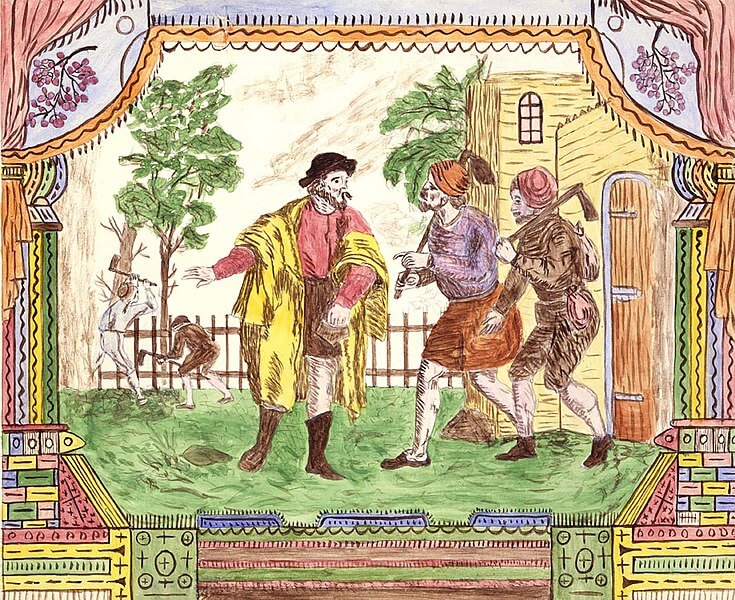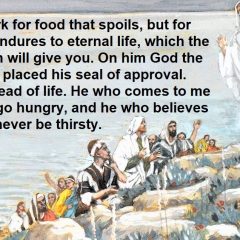gratitude
God Does Not Give Us What We Deserve

25th Sunday Ordinary Time
Fr. Mark Gatto
Preached: September 24, 2023
God does not give us what we deserve.
If we are worried about getting what we think we deserve, it leads to poor ways of seeing God and poor ways of seeing our fellow human beings.
Jesus tells the parable of the various workers called to work in the field. Some who were there the entire day and others only called at the last hour. In the end, each of them received the same pay. Our first reaction is to see this as being unfair. The first people did not feel that they got what they deserved. They also felt that the later ones got more than they deserved. The owner has no patience for them and says, “are you envious because I am generous?”
Are we like them, feeling that we deserve more or envious of others whom we feel deserve less?
Sometimes someone will speak to me who really disappointed or upset with God. They will say that they go to Mass every Sunday, are faithful in their commitments, work hard, why would something bad happen to them? They are thinking that God should give us what we deserve and they obviously feel that they deserve more. It begins with thinking that we earn what we get from God. What we have is not a gift to be received with gratitude, rather it what we have earned on our own and deserve it. A sense of entitlement versus a sense of gratitude.
If we begin with the idea that God gives us what we deserve then we have some real difficulties in our vision of God. An example. Recently we saw thousands of people suddenly killed in an earthquake in Morocco and as many as 10,000 dead in the floods in Libya. Did they get what they deserved? At the same time, we are so fortunate here, without any major natural calamities, with peace and most of us with homes and enough to eat. Are these blessings because we are getting what we deserve?
When we think that God owes us because we deserve it, then we lose our sense of gratitude. When we have good things we think it is due to us earning it and when we have bad things we begin to complain and get bitter since we do not deserve that.
Our life itself is just pure gift. None of us did anything to deserve the gift of life. We did not achieve it or earn it. Life itself is a pure mystery, a gift that we do not deserve. The foundation of our spiritual life should be gratitude.
Thinking that God gives us what deserve also distorts the way we look at our fellow human beings. Those who have more we look at with envy and become bitter. Those with less we fail to see with compassion, we look down on them. In both cases we no longer see brothers and sisters.
Are you certain that God thinks like you? I worry about people who are absolutely sure that they know how God thinks about something! Through the Prophet Isaiah in our first reading, God says, “my thoughts are not your thoughts,…” Last week I saw a display in Toronto of art based on Dante’s Divine Comedy. There I saw a quote from Dante that said, “…doubting pleases me as much as knowing.” We need to be careful when we are so sure that we know how God thinks.
God does not give us what we deserve. Start from there. Then develop a sense of gratitude rather than entitlement. Develop a sense of compassion instead of envy.
No Strings Attached

27th Sunday Ordinary Time
Fr. Mark Gatto
Preached: October 2, 2022
A priest friend was speaking jokingly about another priest friend of mine and said, “with him there are always strings attached.” He was joking, but sometimes we can be that way with God. I go to Mass, I pray, I try to be a good person, but there are always strings attached. We do all this so therefore I deserve special treatment, things should all go well in my life. God owes me. Do we have a sense of entitlement when it comes to our faith?
Jesus says to his disciples that after they have done all that was asked of them they should simply respond, “We have only done what we ought to have done.” We do not live our Catholic Faith and then bribe God with it. A sense of entitlement is actually a sign of lacking faith.
True Faith expects nothing in return. True Faith sees that all is a gift. Our life is a pure undeserved gift. Our Faith itself is a pure gift and not something I earned. We do not expect anything and are full of gratitude for all that we do have. There is no sense of entitlement. I do not do what is right, what is true, what is God’s will, in order to get something in return.
Live our Faith not in a sense of entitlement, but in a spirit of gratitude. When we live our life and our faith rooted in gratitude, it changes everything. When our Faith is rooted in gratitude then it becomes a Faith that is truly able to change the world. For we are not sitting waiting to get what we deserve, we are simply joyful inside for the undeserved gifts that we have received.
In the letter to Timothy we hear the believers being told, “rekindle the gift of God that is within you.” and “God did not give us a spirit of cowardice, but rather a spirit of power and of love and of self-discipline.” Nurture your faith, deepen your faith. If it has weakened then rekindle that gift of God. Do not give in to cowardice, but live your faith with power, with love, with self-discipline.
One of the keys to nurturing your faith is a spirit of gratitude. Reflect on the gift of being alive, the gift of even a small faith, all the little gifts you have in your life. When you are rooted in gratitude then faith is deepened. Then your faith will not have strings attached, will not be about entitlement. It will be freely lived rooted in gratitude.
The Mass is called the Eucharist, which means Thanksgiving. Every time we come to the Eucharist we are giving thanks. Every day take time to reflect on your reason for thanksgiving and give thanks to God.
A spirit of thanksgiving will rekindle the gift of God within you, will take away any spirit of cowardice and lead you to a deeper faith.
We need to live our faith without any strings attached.
Do You Complain A Lot?

18th Sunday In Ordinary Time
Fr. Mark Gatto
Preached: August 1, 2021
Are you a complainer? Are you someone who does a lot of complaining? In our first reading from the Book of Exodus we are told that the Hebrew people were complaining. They had been liberated from an oppressive situation in Egypt and were on a journey back to their home land. Through the leadership of Moses, they were set free by the hand of God.
But, the journey was long and difficult. It was through a wilderness in which they were beginning to experience hunger. So, despite the great gift of liberation from slavery, we see them complaining to Moses and to God. Some translations say they were grumbling. Are we like the people of Israel? Despite the gift of life and the gift of salvation through Jesus, are we complaining a lot on our journey of life on the way to heaven?
I heard a story from J.D. Salinger’s book, Frannie and Zooey. In one scene Frannie comes home from college a nervous wreck. She had made a well intentioned but misguided effort to explore the depths of religious mysticism and it left her extremely tense. Her mother saw this when she got home and showed her concern and care by bringing her a cup of chicken soup. But, though she knew her mother was trying to comfort her, the offer of the chicken soup annoys her, and she lashes out at her mother.
Frannie’s brother confronts her and tells her that her approach to religion is all wrong. He says to her, “I’ll tell you one thing, Frannie. If it is religious life you want, you ought to know that you are missing out on every single religious action that’s going on in this house. You don’t have sense enough to drink when someone brings you a cup of consecrated chicken soup, which is the only kind of chicken soup that Mom ever brings to anybody.”
Does our religion make us miserable and harsh? Does our religion result in us being people who are complaining all the time, grumbling? Our faith should make us people who are grateful, who express gratitude more than complaining and grumbling. When we spend our time complaining we often fail to recognize the grace of God coming to us in the simplest ways in our life.
God fed the hunger of the people of Israel with that bread from heaven that they called Manna. God feeds our hunger with the true bread from heaven, Jesus, the bread of life. But we need to recognize Jesus the bread of life in this Eucharist, in simple bread. We also need to recognize Jesus present in the poor, who are often rough and difficult. We need to recognize Jesus present in the church, for he says that where two or three gather in his name, he is there among them. The church can often be very messy and it can be hard for us to notice Jesus in a simple parish.
When life is difficult, when we experience loss in various ways, when we experience the mess of the church, or our personal failings and disappointments, it can be difficult to notice the grace of God in our life.
Jesus comes to us as the Bread of Life. We need to do less complaining and grumbling, spend more time expressing gratitude. Then we might be able to notice the grace of God in the simple moments of everyday life. In an ordinary Mass, in our sometimes frustrating family, in our messy church and parish, even in our sometimes difficult life.
Lick The Ice Cream When We Can

3rd Sunday of Advent 2020
Deacon Tom Vert
Preached: December 13, 2020
“We have to lick the ice cream when we can!”
You may remember that I worked at Dofasco Steel for 30 years, many in the operations management part of the plant.
In a steel plant there are so many things that can go wrong, and most of the time do!
If it wasn’t an injury in the plant, there was an unplanned maintenance shutdown, or maybe a quality problem with some steel for Toyota, or a dark puff of smoke into the environment or of course an unplanned cost issue.
There was always something each day, though on some occasions, everything would run well with no concerns in any area and I would say to the team “enjoy it, lick the ice cream while we can”.
Licking the ice cream means to appreciate the moment, don’t get distracted by what had happened in the past or what might happen in the future, but enjoy today, before you see a melted dripping ice cream in your hand that you forgot about because you were so focused on the past or future.
Today’s readings challenge us this same thing – to appreciate the present moment for what positives there are.
St. Paul says in the 2nd reading: Rejoice always, pray without ceasing, give thanks in all circumstances; for this is the will of God in Christ Jesus for you.
What a great message to the Thessalonians 2000 years ago and to us today.
The Thessalonians were very stressed, they were being persecuted by the people around them, their property was taken away, they were shunned by their families and some were even beaten and put to death.
Today we have the Covid virus with millions of people around the world infected, and hundreds of thousands have died including people in our own community.
So when Paul tells them and us to rejoice always and give thanks in all circumstances, we may think that he is being unrealistic.
Can he really mean always and in all circumstances? Doesn’t he realize this is a global pandemic that hasn’t been seen in over 100 years! Surely he doesn’t expect that now?
But St. Paul does mean it! He wants them to be licking the ice cream all the time, rejoicing and being grateful every day!
Is this possible for us today? What do we learn from the other readings today?
In the psalm we have sung today, it is one of the only psalms or songs that are not from the book of Psalms in the Old Testament.
The verses we have sung today are the ones that Mary said to Elizabeth when she went to visit her.
Think of the perspective…here is a young Jewish girl, who was told by an angel that she would be an unwed mother in a time in which the shame would have been unimaginable. It was a time in which the Jewish people lived under Roman occupation in horrible circumstances. She was travelling pregnant through the countryside to visit her cousin Elizabeth who was also pregnant under unusual circumstances.
So we have a scared, young girl who is told by her cousin: “Blessed are you among women; blessed is the fruit of your womb; blessed is she who believed that there would be a fulfillment of what was spoken to her by the Lord.”
We can imagine that Mary was thinking how could I possibly be the mother of the Saviour? What does this mean?
And yet we know that her answer mirrors what St. Paul asks us, full of joy and thankfulness she says:
‘My soul magnifies the Lord, and my spirit rejoices in God my Saviour, and why? “for he has looked with favour on the lowliness of his servant.”
Mary has no illusions that she is so much better than anyone else, but instead, she is proud to be fulfilling her role in God’s plan with the birth of Christ.
She goes on to say “Surely, from now on all generations will call me blessed; for the Mighty One has done great things for me,” in other words she is only blessed because of what God has done for her, not how great she is!
What a great lesson for each of us as we are fulfilling God’s plans also in our daily lives by living the unique mission that he has called us to! God acts through us and it is not our super spirituality that drives the mission.
We hear this same gratitude for fulfilling God’s mission in the 1st reading in Isaiah’s words: “I will greatly rejoice in the Lord”.
We hear this message of humility in fulfilling God’s mission in the gospel as John the Baptist says I am not the light but I came to testify to the light.
The beautiful message we hear today is that God wants us to have a life of joy and gratitude, of prayer and connection to Him!
We have joy and gratitude not in some naïve state of seeing nothing going on in the world, but instead for knowing that despite sickness, war, stress, etc., we have joy and give thanks for the present love we feel when we pray; and for the promise of the future of eternal life.
We have joy and gratitude because God gives us the talents and support and grace for the mission he has anointed us to fulfill!
How do we give joy and gratitude? We do it by “living a life worthy of the gospel” and allowing the gifts of the Holy Spirit to be turned into the fruits and exude them in our lives and especially in our interactions with others.
When people see us as we live this life we are called to, they are to see joy, peace, patience, kindness, goodness, faithfulness, gentleness, self-control and of course love!
We can do it because as St. Paul tells us “the one who calls you is faithful and he will do this!
So how do we live this message each day in this time of pandemic?
How do we even see the ice cream so we can eat it?
Well I am thankful to say that this past week I have met some people in our parish that can tell us how. We were visiting people in need for their Christmas help from our giving tree.
These are the people who are already in distress in many cases, living in subsidized housing, many single mothers with multiple children whose lives are stressful on a good day. Or elderly people living alone as we all try and protect them from the virus.
And yet, when we visit, we get a smile and a comment “this is the best present I could have gotten” “we are so glad to see you” “Merry Christmas”, with love and joy in the hearts.
What I learned this past week is that despite whatever is going on there is always something to be thankful for, no matter how small, no matter how brief.
We can recognize it as that key moment in our day, a gift from God to show that us that he is still there watching over us, and then we can realize that God loves us so much and “we can lick the ice cream when we can”!
Live In Gratitude

28th Sunday In Ordinary Time – Year C
Fr. Mark Gatto
Preached: Ocober 13, 2019
Why do you come to Mass on Sunday? Probably different reasons for many of you. Some perhaps find comfort, others find a challenge, others want to focus on the Word of God, others want the presence of Jesus in Holy Communion, perhaps some come because it is an obligation, others come because they are pushed to come by someone, some feel guilty if they do not come.
Lots of different reasons that might motivate us to come. But, the fundamental reason that should motivate all of us along with any of these other reasons is found in the very name of what we are doing. We call this the Eucharist. Eucharist comes from the Greek word which means, Thanksgiving.
We come here to God the Father, with Jesus, united in the Holy Spirit, in the body of Christ, the Church, to give thanks. Like that one Leper out of the ten who were healed in today’s Gospel, who returned to give thanks to Jesus, we come here to the feet of Jesus and give thanks. It is that basic and that essential.
Thanksgiving, Gratitude, is the foundation of any healthy Christian spirituality.
It is not possible to be wise unless deep in your heart is gratitude.
The path to holiness is only possible if the key word in your soul is thank you.
We will prepare for our own death in peace if the one prayer that springs from our heart is thank you. When we come face to face with the Living God, we may have many questions, things we wonder about. But, we are ready for that encounter when the first words that pour forth in the presence of the living God is simply, thank you.
When we look over our life, with its failures, sins, disappointments, plans never achieved, are we still able to respond from the heart, a calm thank you?
It is easy to look at the problems of our world and our own life, to find things to complain about, to see what is wrong with the world, with others, with myself. But, are we able to see the goodness, able to see with gratitude?
To be truly grateful, to live in gratitude, to see with eyes of gratitude, is a sign of holiness, a sign of wisdom.
Interesting that the two people in our readings today that returned to give thanks and were considered saved by God, were so-called foreigners, those seen as outside the grace of God.
In the first reading it was Naaman the Syrian, in the Gospel it was the Samaritan. They were not of the right religion, they would have been seen as outside of God’s covenant at that time. What did each have that saved them? They saw with eyes of gratitude and they returned to give thanks. You could say that gratitude was their path to God.
Take a moment of silence: Close your eyes, think of one thing you are thankful at this moment in your life. Now in your imagination come to the feet of Jesus and express your gratitude. Give thanks.
Go out from here, live in gratitude, see with a grateful heart. Come to the feet of Jesus often in your heart to give thanks.




